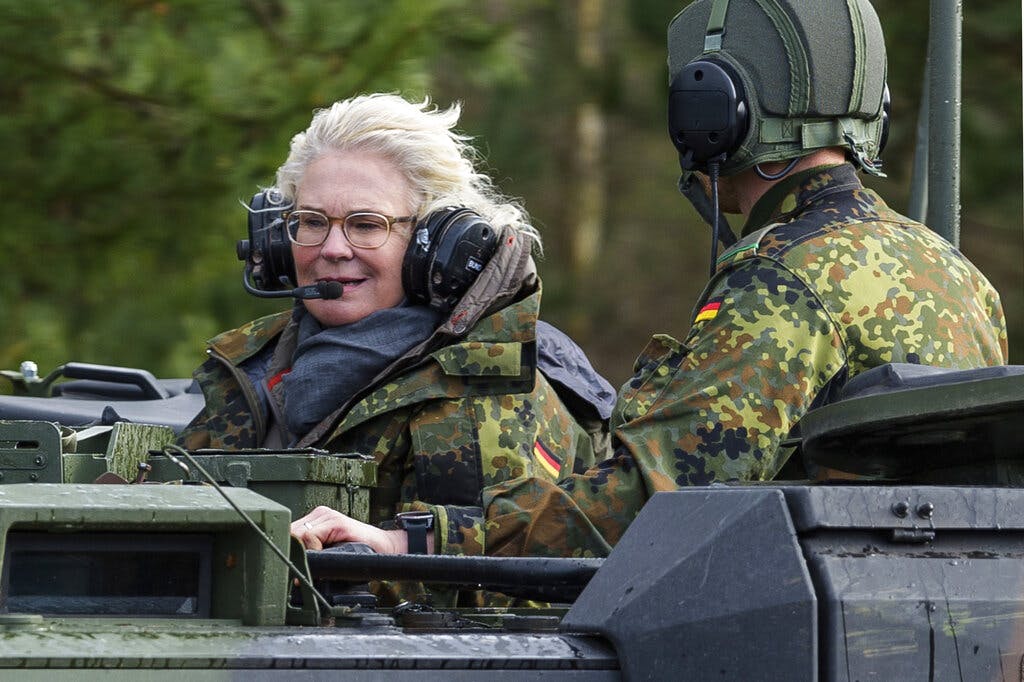Will Defense Chief’s Resignation Alter Germany’s Russia Appeasement Policies?
As NATO allies prepare to meet on the Ukraine war situation, pressure will be on Germany to boost weapons deliveries, but some say a shift from its post-World War II stance is unlikely.

The resignation of Germany’s defense minister promises to loom large at a strategy powwow of Ukraine’s allies Friday, but will it end Berlin’s long-held appeasement approach to its predatory neighbors?
The immediate reason for Christine Lambrecht’s resignation on Monday was an “insensitive” New Year’s Eve video posting in which she discussed horrors of the Ukraine war while celebratory fireworks were visible behind her. Yet, her departure could also signal a new approach to the war.
Defense ministers from NATO countries are expected to meet at the Ramstein U.S. air base Friday to discuss strategies as Russia intensifies its assault on Ukraine. With many urging a more assertive approach, all eyes are on Germany, which as yet has refused to deliver tanks or other battle-changing arms to Ukraine.
“We are in a decisive phase of the war,” NATO’s secretary-general, Jens Stoltenberg, said Sunday. “It is important that we provide Ukraine with the weapons it needs to win and to continue as an independent nation.”
Mr. Stoltenberg commended Prime Minister Sunak’s announcement Sunday that London would send a squadron of Challenger 2 tanks to Ukraine. Fourteen British assault tanks will hardly change the war’s equation, but the announcement is widely seen as a heavy nudge to Berlin to alter its Ukraine policy.
As President Trump’s ambassador at Berlin, Richard Grenell often criticized the German policies on Russia, as well as its reluctance to invest in its own defense. He is skeptical that Germany would fundamentally end its reluctance to arm Ukraine following Ms. Lambrecht’s resignation. “I don’t think so,” Mr. Grenell told the Sun.
Yet, the addition of German-made Leopard 2 tanks could alter the Ukrainian battlefield. Realizing as much, Poland and Finland have already announced they would send a number of them to Ukraine. They are contractually obliged, though, to seek Berlin’s permission to re-export the tanks. As yet, Chancellor Scholz has declined to permit any of the 20 countries that possess the German-made advanced tanks to do so.
Ms. Lambrecht, who, like her party mate Mr. Scholz is a lawyer by trade, became defense minister despite very little background in the field. She has maintained traditional German policies that are based on a long-held fear of provoking enemies.
Mr. Scholz’s predecessor, Angela Merkel, who was much admired by leftists and centrists in America and Europe, pushed such policies as “pragmatic realism.” Her approach was “let’s not upset dictators, let’s do business,” a Europe watcher at the Foundation for the Defense of Democracy, Ivana Strander, told the Sun.
Even before Ms. Merkel, Moscow has been well aware of the German post-World War II sensitivities — the source of its appeasement tendencies. Russia has invested heavily in Germany’s cultural, business, and energy sectors, Ms. Strander said. A former chancellor, Gerhard Schroeder, joined Rosneft and sat on boards of other Russian oil companies.
As ambassador, Mr. Grenell was widely criticized for supposedly interfering in Berlin politics when he pressured Germany to cease the NordStream 2 project with Russia. If completed, that gas line would have increased Germany’s — and Europe’s — energy dependence on Russia. A strong proponent of the project, Mr. Scholz nevertheless suspended its completion last February, in reaction to Russia’s war.
Since the invasion, Germany has supplied some defensive arms, such as air defenses, to Ukraine. Yet, it steadfastly refused to sell heavy combat weapons, and blocked others from doing so. In a possible change of heart, a deputy chancellor, Robert Habeck, said last week that Berlin should not stand in the way of countries that wish to send such weapons.
The Ukrainian army has been using aging and inadequate Russian-made tanks. The Leopard 2s could significantly alter the battlefield. Ukrainian crews could start using them faster than the comparable — but much more complex to operate — American-made M1 Abrams. Also, while the American tank is fueled by kerosine, the Leopards run on diesel, which is more easily available in Ukraine.
To confront Russia in the Donbas and elsewhere, the Ukrainian defense ministry has estimated it needed some 300 advanced tanks. With all of Berlin’s talk about how its World World II crimes have turned it into a pacifist country, Germany has sold a lot of arms around the world, including some 2,000 Leopards across Europe.
The only thing that stops those German-made armored vehicles from reaching the most consequential battlefield in Europe since World War II is Berlin’s politics. This is unlikely to change significantly with the resignation of a defense minister.
Britain has nudged Germany, as have Poland and Finland, by requesting permission to export their own Leopards. Yet, in the NATO gathering on Friday, the most significant pressure on Germany must come from American officials.
When it comes to the Ukrainian war, Washington is “doing better than the nations around the globe, but we’re not doing enough,” Ms. Strander says. “In order not to be in an endless war, we need to supply all the weapons the Ukrainians need.” Pressuring the German leopard to change its spots could go a long way in that direction.

